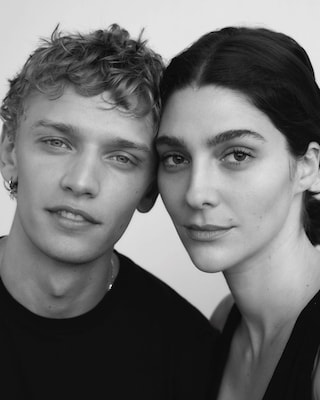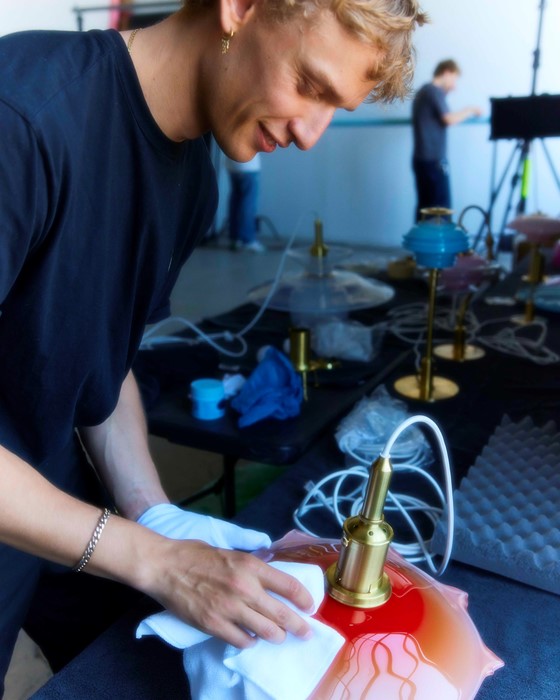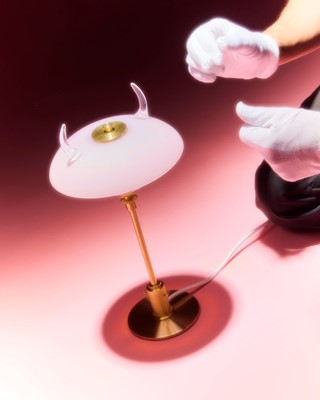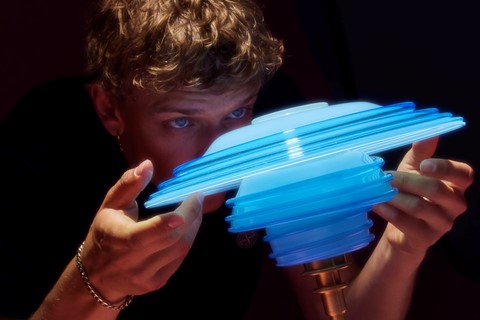As Breanna Box and Peter Dupont debut a new collaboration at Copenhagen’s 3 Days of Design festival, the pair discuss the realities of running a small business, and the problems with the fashion industry
Spotted at the Coperni Autumn/Winter 2022 runway show on Gigi Hadid, at The Grammy Awards on Doja Cat and Tinashe, and on Instagram (of course) on the arm of Kylie Jenner, in spring 2022 the internet went wild for glass artist duo Heven’s take on the Coperni Swipe Bag. This marked the first of a line of collaborations from the New York-based pair, made up of US filmmaker and musician Breanna Box and Danish model and entrepreneur Peter Dupont – who AnOther first spoke to back in September 2021.
Creative partnerships can be a catalyst for a range of publicly aired frustrations, from miscredited design work to unfair compensation, but Box has learned to take control from the outset. “I let people know from the beginning who they’re fucking with,” she says. “People come to us for the specificity of how we design, so I think something I’ve learned, especially as a woman, is how to say no more. I’ve always known how to say no, but now people are listening to my no.”
In May of this year, French lingerie brand Etam partnered with Heven to produce a maximalist collection of minimal coverage swimwear, including an under-the-sea-inspired glass Mermaid Corset. Most recently, Box and Dupont have leaned into the latter’s Danish heritage, working with heritage Scandinavian design icon Louis Poulsen to create one-of-a-kind artistic interpretations of the lighting brand’s classic Pale Rose collection, unveiled as part of Copenhagen’s annual 3 Days of Design festival. With further unannounced collaborations confirmed for Paris Fashion Week and beyond, the pair – who also got engaged earlier this year – are quick to mention that they’ve barely had time to come up for air since their public breakthrough with Coperni, but that it hasn’t stopped them carving out a future for Heven as a standalone brand and home for their ambition.

“It’s kind of funny, the only chance you get to reflect is in interviews,” says Box. “It’s been super busy. The Louis Poulsen thing was very last minute, but it was incredible. We have some things that we’ve been working on for a long time, but then random things will pop up. We just haven’t really had a moment to breathe. We’re opening a store in about a month in New York, which is going to be such a dream come true, in a weird way. I never thought I’d want to get into any type of small business, because I watched my grandparents suffer with their flower shop, but I think you can’t have fear. If we tried to have logistical minds from the beginning of this whole Heven project, it never would have happened.”
While Heven’s high-profile collaborations and viral creations have catapulted Box and Dupont into the spotlight as glass artists and designers, it’s the pair’s passion for filmmaking that provided the foundation for the brand. Before Box’s beloved grandfather passed away in March 2022 – something that happened, she explains, “just days” after their first major Coperni PR moment and as “the hardest experience” of her life – she had begun making a documentary about his life. A self-proclaimed filmmaker and musician first, Box and her partner Dupont have grown Heven as a vehicle for funding their ventures in film. Speaking about Box’s late grandfather, Dupont adds, “He is our guardian angel and inspiration. He was important at that time, and he is the reason why we started the whole project; to fund and make this documentary about him.”

As artists and designers are forced to navigate an era where business is done in the DMs, and Andy Warhol’s 15 minutes of fame have been usurped by a motion-sickness inducing 15 seconds of social media hyper-exposure, it’s difficult to see how genuine creativity can be nurtured in an economically sustainable way. Reflecting on the sky-rocket trajectory of Heven’s profile in its infancy, Dupont shares the reasoning behind their decision to keep their project genres varied in order to sustain their brand. “After Coperni we realised that we’re not a one trick pony. We can do other projects, and we have way more things to do. Working with a big brand like Coperni, that is very wholesale orientated, in a fashion space that’s getting faster and faster, is hard, and I think that’s a general problem in the fashion industry: it’s so fast and so focused on a wholesale structure that it’s falling apart.” With the future of Heven built on creative independence, Dupont states the importance of moving forward without looking back too often. “I’m super happy with what we did and how that collaboration came about, but at the end of the day, that was also the time for us to split.”






